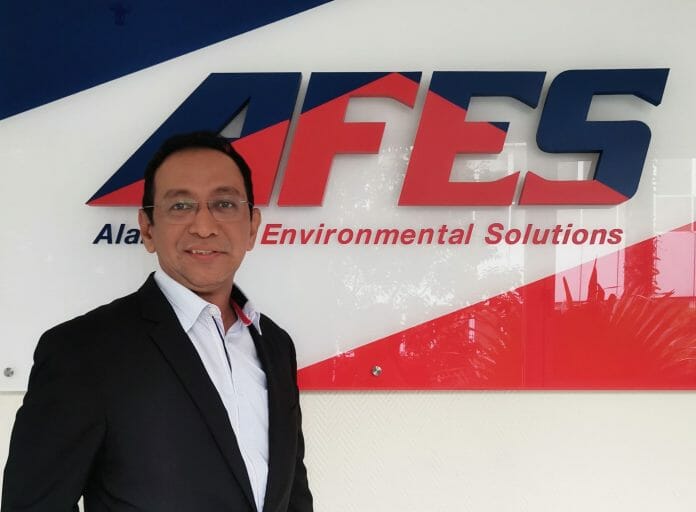According to media reports, the Housing and Local Government Ministry (KPKT) is looking at increasing the country’s recycling rate by 2 percent per year until 2025. This is as per the 12th Malaysia Plan’s target of reaching 40 percent recycling rate by 2025.
The ministry has also reported that in 2020, the country has recorded a recycling rate of 30.67 percent, exceeding the target of 30 percent that has been set for the year. Additionally, reports from the Ministry have also shown that 2.76 tonnes of plastic waste were successfully recycled out of the 4.27 tonnes of recyclable waste collected in 2019.
In contributing to the Government targets, Alam Flora Environmental Solutions Sdn Bhd (AFES), a wholly-owned subsidiary of Alam Flora Sdn Bhd (Alam Flora), under Malakoff Corporation Berhad (Malakoff) believes through its waste recovery facility or known as RISE@KL Facility that is in the midst of development by our specialised team, it will be able to recover an additional of 50 to 100 tonnes of recyclable waste a day. This in return, will enable AFES to close the gap.
AFES’ commitment towards improving the state of recycling system in the country is reflected by the development of various educational and waste diversion facilities. This year, both government and private sectors have now prioritised their sustainable development goals. With that it has boost the demand of recovery initiatives in Malaysia. Among them includes, the Fasiliti Inovasi Kitar Semula (FIKS). First of its kind in the country, FIKS is an education-based centre created with the main purpose of increasing increase awareness among Malaysians, on the importance of recycling and, on how everyone can play an important role in contributing positively to the recycling eco-system at large.
Visitors to the FIKS centre, be it virtually or physically, will themselves be able to participate in learning the types of materials that can be recycled and have a personal look into the recycling process taking place behind the scenes at the Integrated Recycling Facility (IRF), an operation area for waste segregation.
Establishing RISE@KL
As of 2021, the Kuala Lumpur Transfer Station (KLTS) is currently the drop-off point for recyclable items coming from Klang Valley area which has increased in tonnage from average of 35 tonne/month in 2016 to 80 tonne/month in year 2021 with an increase rate of 44%, hence AFES decided to launch the Recovery Initiative Sustainable Eco-Facility or, RISE@KL to cater the growing market in the KL city.
According to AFES, RISE@KL is a facility designed based on semi-automated process to accept recyclable materials comprised of paper, plastic, light scrap, aluminium cans, beverage cartons, glass bottles and e-waste that have been separated at the source from municipal solid waste generated either from single-stream or dual-stream sources.
Within the facility, the recyclable materials are then sorted to specifications, then baled or shredded for the end-user manufacturers and reprocessed into new products. Visitors can also gain valuable knowledge on recycling processes through the education hub, observation point and the weigh bridge room.
“We are optimistic that RISE@KL will be able to contribute significantly towards increasing the recycling rate in the country and accelerate the recycling and recovery business velocity.
“We are also targeting through the facility, to reduce waste sent to landfills and enabling us to implement a circular economy model and commit to SDG12 in parallel with Malaysia’s goal of achieving more than 40% recovery rate by 2025 and, to achieve a carbon-neutral status by 2050,” says Nazar Abdul Raof.
Making Economical and Sustainable Sense
From an economic and sustainable point of view, Nazar Abdul Raof says AFES’ recycling efforts have saved recyclable wastes from going directly to the landfills. However, this can be greatly improved via a collective effort from the government, local housing and development authorities, communities, residents, and event schools.
“Waste separation at source, be it from anywhere, is a key component in the concerted effort to divert waste from landfills and to maximise the recovery of recyclables.
“Recyclables recovered in the year 2018 were 2,860 tonnes and 3,744 tonnes in 2019. This shows an increase in percentage on the recovered recyclables, of up to 31%. Meanwhile, in 2020, the total tonnage of recyclables recovered, was 4,127 tonnes, an increase of 11%,” he says.
He added, “We are keen to collaborate with manufacturing industry, fast-moving consumer goods industry (FMGC) and many more, as these industries are also moving forward towards achieving their sustainable development goals.
Moving Forward
There are several future plans in the pipeline for AFES for their sustainable solutions business. The waste management service provider is embracing circular economy by building recycling facilities that are no longer using the linear approach of just waste collection and disposal.
AFES is also piloting a few R&D initiatives on the conversion of plastics to fuel, food waste to energy and, the use of black soldier fly (BSF) in biowaste treatment.
“Our business model is towards providing sustainable solutions. We will continue to seek and invest in more sustainable facilities and better technologies that can also treat the wastes and, for repurposing activities. This will divert the wastes from going to landfills and put it to greater usage. Just like giving the waste a second lease of life,” Nazar Abdul Raof says.
He further adds that AFES aspires to maximise the recovery of the recyclables and reduce landfill waste. However, this will require extraordinary effort in amplifying awareness through more outreach programmes in educating the public on the importance of waste separation at source and getting buy-in from all key stakeholders; relevant ministries, key opinion leaders, partners, companies and the authorities to implement a structured and more stringent approach in reducing waste nationwide.
“It is indeed a serious business and AFES is seriously committed to it especially so, towards creating a sustainable world for the future generation to inherit and live in,” concluded Nazar Abdul Raof.









